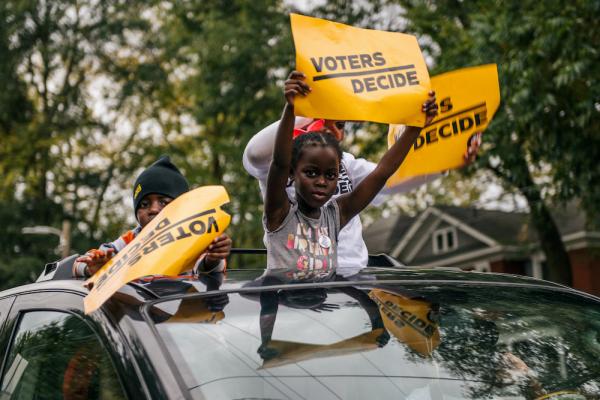In the 2016 presidential election, 22 percent of eligible Georgia voters were unregistered. Four years later that number has dropped to just two percent.
This massive expansion of voter registration was no accident. Since conceding to now-Gov. Brian Kemp in a race that was clouded by accusations of voter suppression, Stacey Abrams has been working to execute a simple but elegant strategy for getting out the vote: “expand the electorate through deliberate, unprecedented investment.” In just two years, an estimated 800,000 voters have been registered by The New Georgia Project, which Abrams founded in 2014, and her newest platform, Fair Fight, which has focused on election reform. Both have utilized faith leaders as major vehicles for engaging voters.
That expansion in registration, also spurred by a recent administrative change that made registration the default option on driver’s license forms, led to record voter turnout. Though official numbers have not been released, early voting alone almost matched the total number of ballots cast in 2016.
While the nation’s eyes are newly refocused on Abrams’ contributions and the upcoming runoff election — a fight for two open senatorial seats that may determine which political party will control the U.S. Senate — her organizations are far from the only ones working with faith leaders to maintain voting rights and protections throughout the state.
“Whenever we do voter registration, we reach out to every house of worship that we have any contact with,” said Esther Lim, who directs organizing and civic engagement at Asian Americans Advancing Justice (AAAJ), a civil rights nonprofit. “I will literally convince some people to vote by using Bible verses.”
Asian American voter turnout in Georgia increased 141 percent since 2016 based solely on early turnout, growth that occurred despite a lack of non-English voting materials. While AAAJ was able to work with DeKalb County to offer the state’s first official Korean-language ballots, Asian Americans speak dozens of languages, few of which are available on voting materials.
AAAJ has independently created voter resources in languages including Chinese, Vietnamese, and Hindi.
“Even in English, the realm of politics is incredibly complicated, but we want people to understand how much power we could potentially have [through voting] and what that would mean for our community,” Lim said.
AAAJ is not alone in their efforts to break down language barriers to voting. The Georgia Muslim Voter Project (GAMVP), launched in 2015, has produced its own voting guidelines in Arabic. Though Muslims make up less than 1 percent of the state’s population, GAMVP, along with Inner-City Muslim Action Network and the Council on American-Islamic Relations, has worked to engage a mix of 18-year-olds, new immigrants, and disengaged Muslim voters statewide, helping to increase the number of registered Muslim voters by more than 10,000 in two years, according to GAMVP data.
“In 2018, only the state’s Muslim leaders understood where we could go,” GAMVP executive director Umer Rupani told Sojourners. “Now, through a grassroots effort, we’re seeing the entire community become engaged.”
Though these voting organizations are themselves nonpartisan, many credit this concerted effort to increase and court disengaged segments of the electorate with helping to flip the longtime Republican stronghold blue for the first time in almost 30 years.
In a memo distributed to her Democratic colleagues in September of last year, Abrams explained that expanding civic participation is not only good for democracy, but could also turn dividends for the party.
“We refused to limit our scope of opportunity to the narrow slice of possibly persuadable, likely voters, and instead resolved to invest in all potential votes,” the memo read.
But while voter turnout and registration have increased, both Rupani and Lim expressed concerns that increased scrutiny and misinformation over the state’s election results may dissuade some constituents from heading to the polls in January.
Before Georgia officials certified Biden's win last Friday, President Donald Trump and his supporters circulated baseless claims of mass fraud, with Georgia Secretary of State Brad Raffensperger telling the Washington Post that his fellow Republicans, including Sen. Lindsey Graham (R-S.C.), pressured him to find ways to discount votes. Both of the state’s Republican incumbents, David Perdue and Kelly Loeffler, called for Raffensperger to resign, accusing him of “mismanagement and lack of transparency,” providing no evidence to validate their claims. Democratic senatorial challenger Rev. Dr. Raphael Warnock told Sojourners that Loeffler, his opponent, is seeking to “erode trust in our democracy for her own political benefit.”
Darrin Sims, a criminal records and reentry legal specialist at Georgia Justice Project (GJP), has seen firsthand how misinformation can dissuade underrepresented voters from casting their ballots.
Georgia has more people under correctional supervision than any other state and depending on a person’s system status, their ability to vote can fluctuate.
“Most people assume that, if they’ve been incarcerated, they can’t vote,” Sims said. “People don’t want to put themselves at risk of [unknowingly] violating their parole and going back to jail. Some people choose to avoid voting all together.”
GJP has had particular success working with chaplains to help make connections with incarcerated voters. Sims credits a chaplain with helping the organization distribute absentee ballots and display voting information on TVs at the Gwinnett County Jail.
“In a race this tight, we recognize that these votes absolutely matter,” Sims said. “They’ve always mattered, but the public is finally realizing that they weren’t a part of the conversation.”
Got something to say about what you're reading? We value your feedback!





